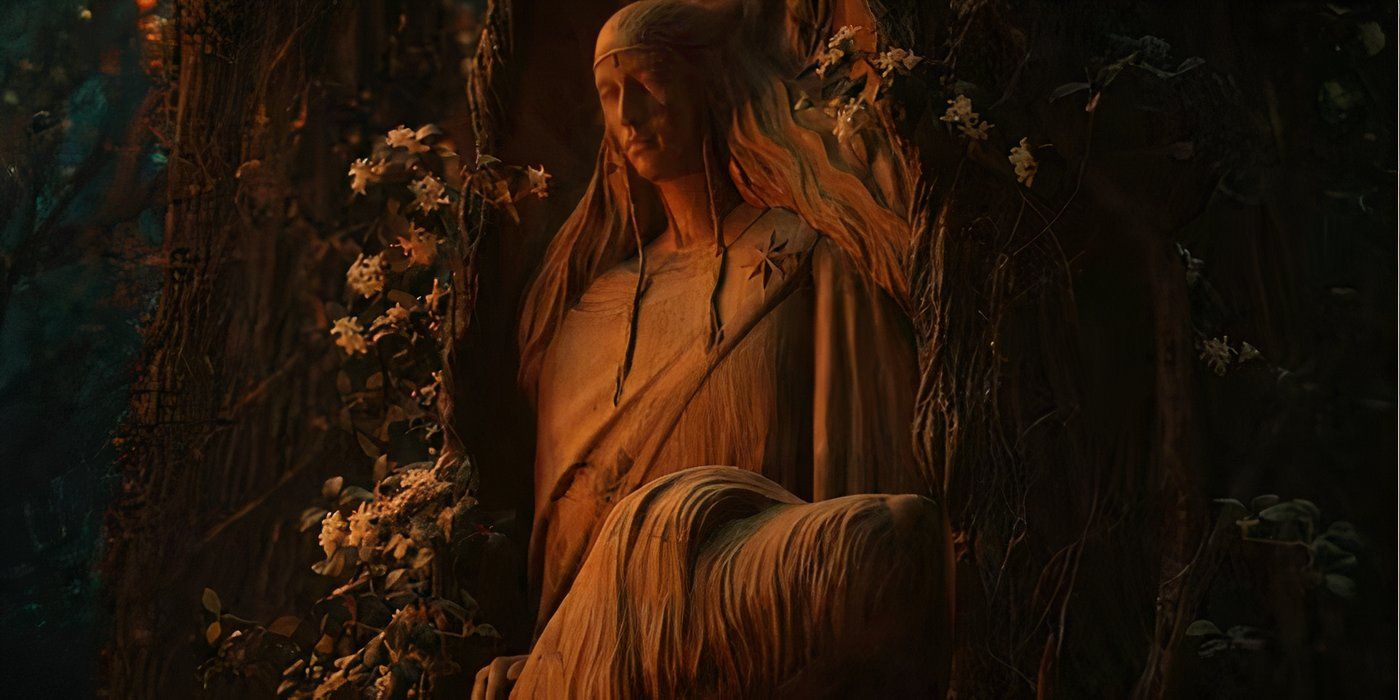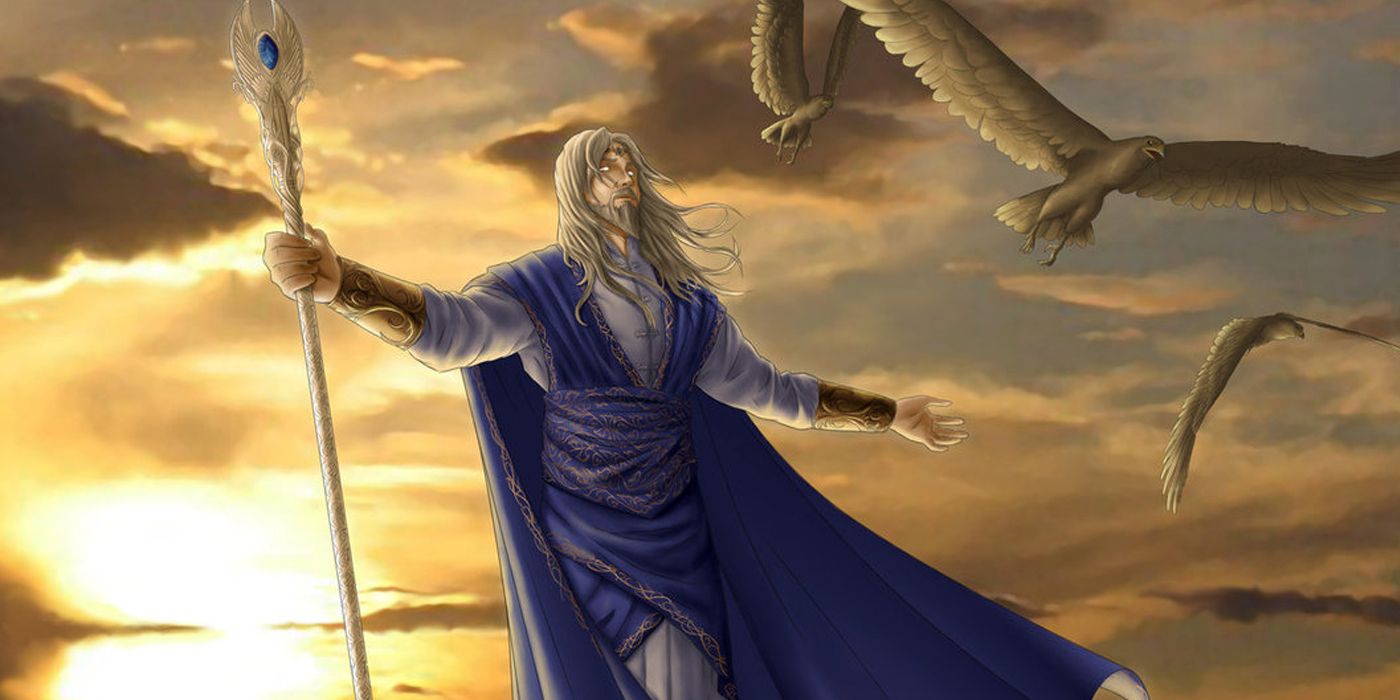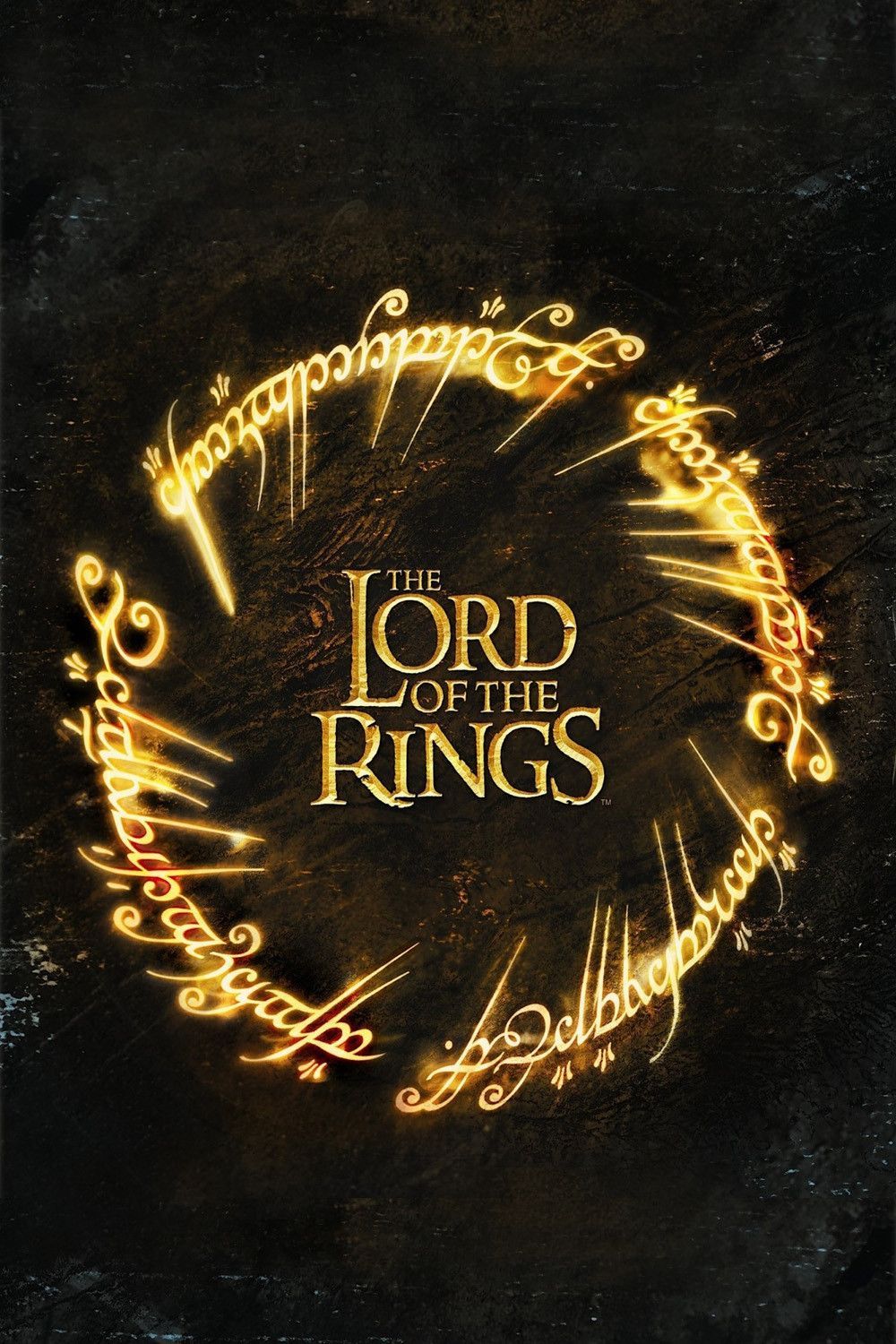This article contains spoilers for The Silmarillion.
Morgoth was the original villain of The Lord of the Rings, preceding Sauron in his wickedness and committing many crimes in Middle-earth. Meaning “Black Foe” in the Elvish language Sindarin, Morgoth was the name given to the Vala Melkor in the First Age by Noldor Elf Fëanor. Morgoth’s malcontent sprung from pride in a land before time known as the Timeless Halls. Created, along with the others of his Ainur race, by the One, Eru Ilúvatar, Melkor was one of the nine Aratar, the greatest of the 15 Valar, who themselves were the greatest of the Ainur.
Served by the Maiar, the lower order of Ainur, the 15 Valar descended into Arda from the Timeless Halls to build it from the ground up. Eru had given the Ainur a theme, and they had proceeded to sing the Ainulindalë, which visualized Arda. Once in Arda, the Valar were bound to it forever, promising eons of trouble to come – Melkor tried to impose his rule but the other Valar opposed him. The conflict that ensued spanned millennia, but even after being cast into the void, Morgoth tainted and affected Middle-earth.
10 Attacking Arien
Morgoth’s Predatory Nature Surfaced Throughout The Legendarium
Morgoth was that rare breed of evildoer that somehow managed to encompass nearly every kind of heinous act, including those of a carnal nature. Morgoth conspired to assault Lúthien in “The Lay of Leithian.” In Morgoth’s Ring, Christopher Tolkien published an essay that J.R.R. Tolkien had written called Notes on Motives in the Silmarillion. This work discussed how Morgoth attacked the Sun Maia Arien, though Tolkien didn’t necessarily intend to publish it. It gave an insight into Morgoth’s worst proclivities.
A
Rings of Power
season 1 Easter egg appeared to show a memorial of Huan and what could have been either Lúthien or Celegorm behind him.
Intriguingly, Tolkien referred in this essay to evil as being barren but fissiparous – unable to reproduce sexually, but capable of spawning kinds of offspring by splitting itself into multiple parts. Tolkien referred to Morgoth’s attack on Arien, which was also covered elsewhere in the legendarium. Morgoth “ravished” Arien and in Morgoth’s Ring, Tolkien chillingly confirmed that “this was to destroy and distain’ her, not to beget fiery offspring.” Morgoth also carried out invasive breeding programs for species like Orcs.
9 The Destruction Of The Two Lamps
Morgoth Destroyed Almaren & Its Light
While in Arda in the Days before Days, Morgoth destroyed a monumental part of the world’s history and beauty. Long before the Elves had awakened in Cuiviénen or the Two Trees were formed, the Valar were based on an island called Almaren. This island was central to Arda and lit by two giant lamps called Illuin and Ormal. The lamps had been made by the great smith, Aulë. This Vala didn’t make the lamps alone – the Valier Varda filled them with a magical light, blessed by the Vala Manwë.
|
Tolkienian Age |
Event Marking The Start |
Years |
Total Length In Solar Years |
|---|---|---|---|
|
Before time |
Indeterminate |
Indeterminate |
Indeterminate |
|
Days before Days |
The Ainur entered Eä |
1 – 3,500 Valian Years |
33,537 |
|
Pre-First Age Years of the Trees (Y.T.) |
Yavanna created the Two Trees |
Y.T. 1 – 1050 |
10,061 |
|
First Age (F.A.) |
Elves awoke in Cuiviénen |
Y.T. 1050 – Y.T. 1500, F.A. 1 – 590 |
4,902 |
|
Second Age (S.A.) |
The War of Wrath ended |
S.A. 1 – 3441 |
3,441 |
|
Third Age (T.A.) |
The Last Alliance defeated Sauron |
T.A. 1 – 3021 |
3,021 |
Lighting the whole world, the lamps were completely unique and were never remade. Unfortunately, around this time, the Vala Melkor was engaged in constant fighting with the other Valar, trying to gain total control. What Melkor couldn’t dominate, he wanted to destroy. He demolished the lamps and their huge size caused their collapse to destroy Almaren and change the structure of the whole world.
8 The Destruction Of The Two Trees
Morgoth And Ungoliant Stole The Light Of Arda
Morgoth teamed up with a giant spider called Ungoliant to end the Valar’s next attempt to light Middle-earth. As if the Two Lamps had not been a big enough loss, Morgoth destroyed and poisoned the Two Trees with Ungoliant. Unlike the destruction of the Two Lamps, the end of the trees was remembered by the Elves, who were inhabiting Valinor at the time of their fall. Tolkien confirmed in The Silmarillion that “no tale could contain all the grief and terror” that befell following the destruction of the Trees.
Amazon Prime Video’s
The Lord of the Rings: The Rings of Power
shows the Two Trees in Valinor in season 1.
Ungoliant was able to weave webs of darkness that were more than just the absence of light but a suffocating ill will, able to “enter heart and mind.” Melkor escaped with Ungoliant but fought with her over her payment for her assistance, ending in a scuffle that saw Ungoliant overpower him. With precious gems called Silmarils in hand, Morgoth called for help and Balrogs came to his rescue, sending Ungoliant packing. However, the damage was done and the Valar raised the Pelóri mountains and Enchanted Isles to protect their realm.
7 Corrupting The Noldor
Morgoth Poisoned The Noldor Against The Valar
In what was unquestionably one of Morgoth’s worst acts while in Arda, he corrupted the Noldor Elves against the Valar. Melkor had been imprisoned and only just released when he got to work sewing seeds of hate among the Elvish Eldar. Allowed to roam Valinor under the Valar’s supervision, Melkor was stewing in his resentment and worked subtly to undermine the Valar. Melkor befriended the Noldor Elves, while the Vanyar Elves were more suspicious and the Teleri didn’t have as much to do with him.
The Noldor were great smiths and scholars and had a lot of interest in the esoteric knowledge that Melkor could provide. Melkor shared useful information with the Noldor but littered his words with false rumors about the Valar that gradually made the Noldor suspicious of them. Melkor also poisoned the Noldor Elves against each other. They ended up ignoring the Valars’ guidance, which had dire consequences like getting them exiled from Valinor.
6 Corrupting The Maiar
Morgoth Corrupted Balrogs And Sauron Into His Service
It was unknown exactly when Melkor first started corrupting Maiar to his service, but some evil Maiar of note were the Balrogs and Sauron. Known as Úmaiar in the Elvish language Quenya, these spirits were the chief servants of Morgoth. The Úmaiar carried on tormenting Arda long after Morgoth’s relegation to the void. If it wasn’t for Morgoth’s early persuasion of his fellow Ainur, Sauron would never have been unleashed on Middle-earth as a tyrant, creating the One Ring.
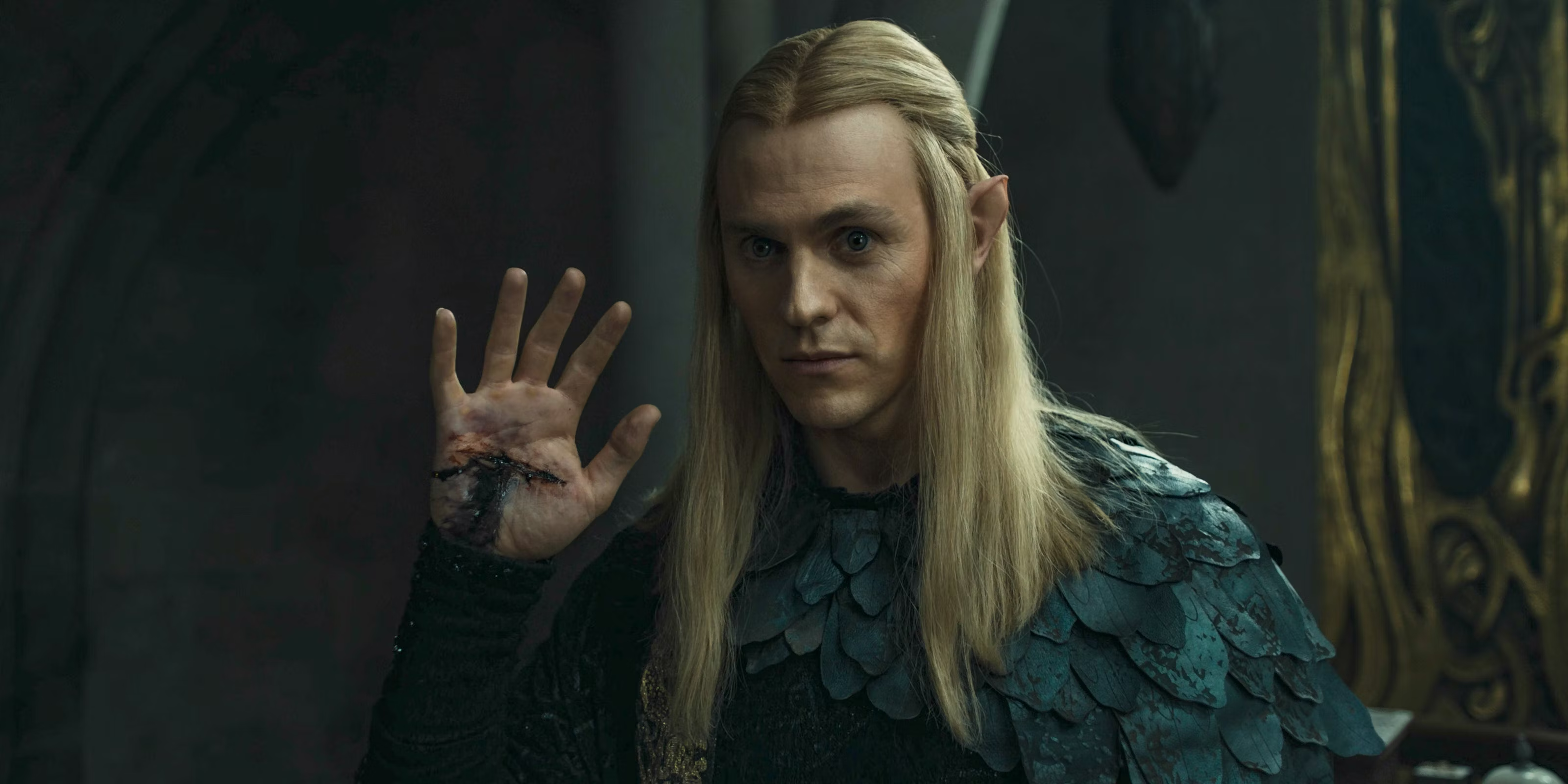
Related
What Sauron Really Is In The Lord Of The Rings: True Nature & History Explained
The eponymous Lord of the Rings is an enigma in the novel and the movies but answers are available in Tolkien lore as to his true nature.
It was Sauron’s love of order and distaste for “wasteful friction” that drew him to Morgoth. This evidenced how, sadly, Morgoth was able to corrupt what was best in people. Sauron was good in Lord of the Rings for so long that he developed a huge legacy among the people of the Vala Aulë and remained “mighty in the lore of that people” even after his fall. This demonstrates what might have been had Morgoth only not been so determined to lure so many spirits to his cause.
5 The Battles Of Beleriand
Morgoth’s Wars Eventually Ended The First Age
Before the events of The Lord of the Rings and even before the events of The Rings of Power, Morgoth waged the multi-battle War of the Jewels against Elves, Men, Dwarves, and Ainur. This First Age war saw huge tragedy befall the Elves in Morgoth’s Sack of Gondolin, which destroyed one of the greatest Elvish strongholds in Middle-earth’s history. The great Battles of Beleriand included the Nirnaeth Arnoediad, a decisive victory for Morgoth. Also known as the Battle of Unnumbered Tears, this battle left a mound of the fallen so big that it came to be known as the Hill of the Slain.
Morgoth’s forces were so repelled by the Hill of Slain in ages after that they would not go near it. Morgoth fought the High King of the Noldor, Fingolfin, in single combat, during the Dagor Bragollach, or the Battle of Sudden Flame. Fingolfin managed to injure Morgoth’s foot, and he had a limp forever after, but he lost the fight. Morgoth killed one of the greatest Elves in the world. But most impressively, Morgoth fought the Host of the Valar in the last Battle of Beleriand, the War of Wrath, which was so cataclysmic it sunk Beleriand.
4 Stealing The Silmarils
Morgoth’s Theft Triggered More Than Just War
Morgoth infamously stole the Silmarils, the namesake of Tolkien’s The Silmarillion, which means “of the Silmarils” in Quenya. The Silmarils were three mighty gems crafted by Fëanor. In his possessive nature, Morgoth naturally became just as obsessed with the gems as Fëanor. Killing Fëanor’s father, Finwë, to get the Silmarils, Morgoth’s theft occurred after another hideous crime – his attack on the Two Trees of Valinor. Amounting to one of the darkest times that the people of Arda had ever seen and would ever see, Morgoth stole both Arda’s light and Silmarils, fleeing to Middle-earth.
Maedhros cast himself into a fiery pit and Maglor threw his Silmaril into the sea and disappeared, ending two of Fëanor’s greatest sons in the tragedy that the Valar had prophesized.
Fëanor and his sons swore an oath to get them back, come what may. This oath would lead them through three bloody Kinslayings. Following Morgoth to Middle-earth, the Noldor were exiled and cursed by the Valar. With one Silmaril ending up in the sky with Eärendil the half-Elven, Maedhros and Maglor each found a Silmaril in the end, but were unable to bear it, due to the curse. Maedhros cast himself into a fiery pit and Maglor threw his Silmaril into the sea and disappeared, ending two of Fëanor’s greatest sons in the tragedy that the Valar had prophesized.
3 The Discord & Marring Of Arda
Morgoth Marred Arda Over Millenia
The Marring of Arda may actually be Morgoth’s worst crime, but it happened in multiple stages and squares off against one other devastating sin that Tolkien himself cited as Morgoth’s worst. Melkor introduced discord to the Ainulindalë, based on his growing pride that told him he was worthy of bestowing life itself, which was the sole province of Eru Ilúvatar. He wanted to introduce his own independent ideas because he essentially distrusted Ilúvatar’s authority. This discord manifested in the plan for Arda, setting the wheels in motion for a problematic and fraught future.
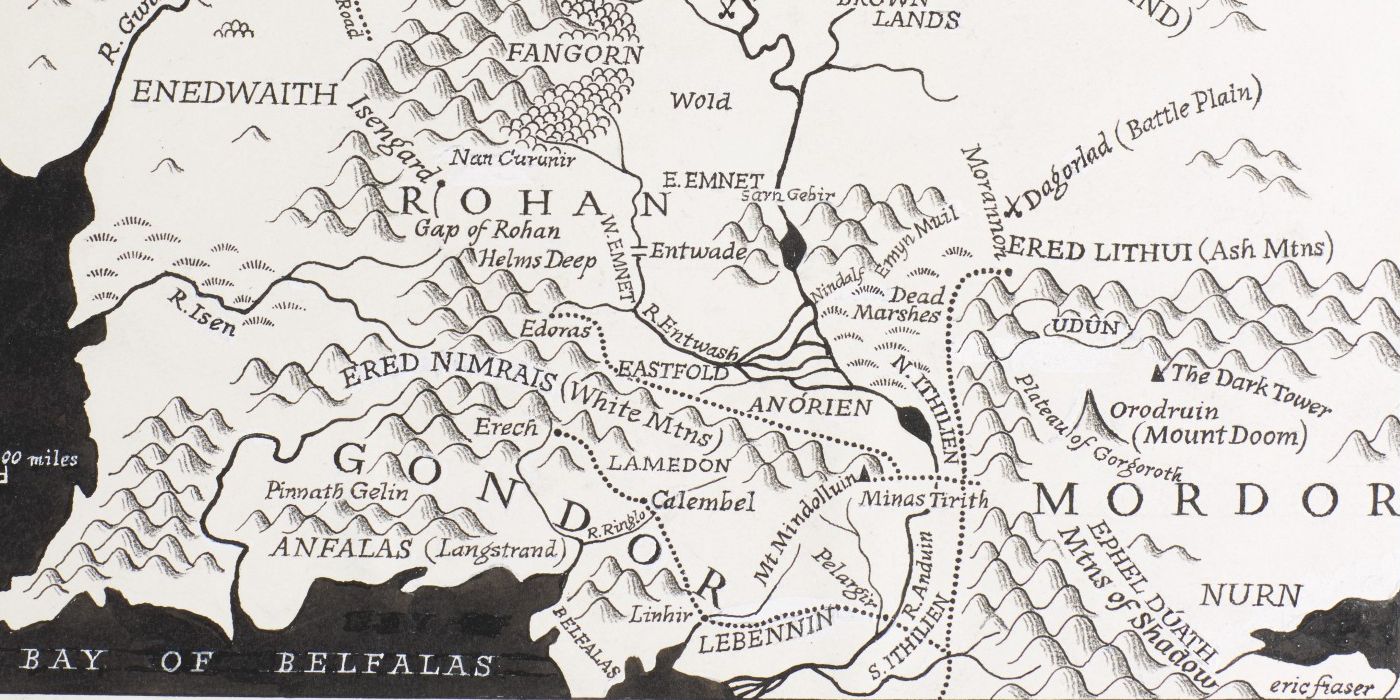
Related
The Lord Of The Rings Map Explained: All Middle-Earth Locations
Lord of the Rings’ most famous location, Middle-earth, was just one continent in the wider world, proving the depth of Tolkien’s worldbuilding.
This was the beginning of Melkor’s Marring of Arda, a complex process whereby Morgoth stained the entire course of the world’s history. The Marring of Arda ensured that even Morgoth’s defeat in the First Age couldn’t cleanse his influence from Middle-earth. The “bonds that Morgoth had laid upon” Sauron were strong and just as Sauron couldn’t escape following Morgoth down his path, Arda couldn’t escape Morgoth’s impact until it was broken and remade in a final battle called the Dagor Dagorath. Tolkien never finalized the Dagor Dagorath but referred to it in many stories.
2 The Battles Of The Powers
Arda Was Morgoth’s Ring
Morgoth vied for control of Arda with the Valar during the Battles of the Powers, during which Morgoth embedded his corrupt essence into the fabric of the world itself. After introducing his discord into the Music of the Ainur, Morgoth went down into Eä – the universe that contained Arda – and created Arda with the Valar. The Valar would create beauty and Morgoth would tear it down and corrupt it. This fighting resulted in tumultuous landscapes that were never quite as the Valar intended.
…Morgoth imbued his being into Middle-earth the same way Sauron poured his being into the One Ring.
Eru revealed how even Morgoth’s disobedience had resulted in a plan more beautiful than anything anyone could have imagined. However, Morgoth imbued his being into Middle-earth the same way Sauron poured his being into the One Ring. Arda was Morgoth’s Ring and many things born into it contained the “Melkor ingredient,” corruptible to cruelty. Morgoth and Sauron’s immorality bound them to their physical forms, but this sacrifice didn’t outweigh the permanence of their effect on Middle-earth.
1 The Creation Of Orcs
The Vilest Deed Of Melkor
Although the Marring of Arda was arguably further reaching, the creation of Orcs was a perverse insult to life itself. J.R.R. Tolkien said that it was “the vilest deed of Melkor and the most hateful to Ilúvatar.” This crime exemplified the sin at the core of Melkor’s actions. Morgoth’s pride led him to seek the Imperishable Flame in the void and the ability to bestow life. This ability was practically synonymous with Godhood. Wishing to rise to the level of Eru himself, Morgoth made the race of Orcs in The Lord of the Rings in “mockery of the Children of Ilúvatar.“
…Orcs fought the forces of light time and time again, causing untold misery and death.
Cruelly, Morgoth approached Elves not too long after their awakening and, “by slow arts of cruelty,” corrupted them into the first Orcs. This Orc origin story was one of many but seemed to be the dominant one and was the one that Christopher Tolkien chose in his final edit of The Silmarillion, which his father had entrusted to him to finish. Orcs were Morgoth’s victims, used as cannon fodder. But more glaringly in The Lord of the Rings, Orcs fought the forces of light time and time again, causing untold misery and death.
